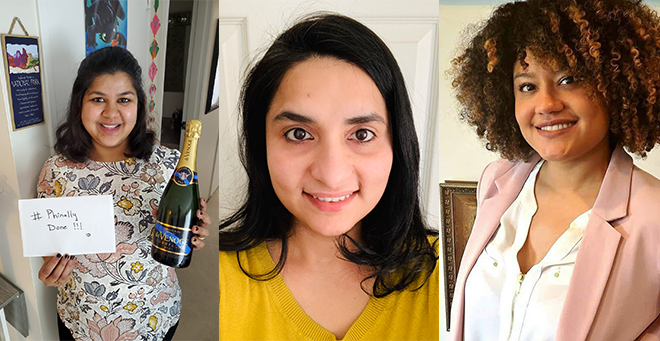
and Ciearra Smith |
After years of study, 17 Graduate School of Biomedical Sciences PhD candidates had the unusual experience of defending their theses virtually, via Zoom, this spring. For some, the socially distant alternative to a traditional dissertation became an opportunity to reach a larger audience that included relatives and friends from near and far.
“It was certainly weird at first, because you cannot see anyone’s facial expressions or gestures while you’re speaking,” said Mona Motwani, GSBS ’20 PhD candidate in immunology and microbiology.
“But if we didn’t switch to the virtual option, my extended family and friends would have never been able to attend.”
“I had 109 people sit in for my presentation,” said Ciearra Smith, GSBS 20 ’PhD candidate in neuroscience. “We might have missed the pomp and circumstance, but I thought it went better than it would have been in-house.”
The dissertation defense is the final step for students earning a PhD, showcasing their years of compiled research. As they prepare for the GSBS Class of 2020 commencement ceremony, to be held at noon on Sunday, May 31, the students are reflecting on this moment.
“I’ve always had a passion for science, and I’m so glad I’ve made the choice to pursue a career in it,” said Neha Diwanji, GSBS ’20 PhD candidate in cancer biology. “When it came time to defend my research, I was nervous about how people would perceive it on Zoom. In the end, it turned out to be a great learning experience.”
Motwani’s dissertation is focused on cytosolic DNA sensing in autoimmune and autoinflammatory diseases. She focused on a rare lung disease known as SAVI (STING-associated vasculopathy with onset infancy.) Using mouse models, she was able to identify which cells are impacted due to a STING mutation, and what tissues they are affecting. STING is a protein important in innate immunity.
“Besides working on a rare disease, I also work on lupus, an autoimmune disease that affects millions world-wide, primarily women,” Motwani said. Using different mouse models of lupus, Motwani was able to show how activation of the STING protein may limit autoimmune diseases, suggesting a possible therapeutic approach.
Motwani recently accepted a position as a senior scientist at Sanofi in Framingham.
Smith used mouse models to study circadian rhythms in specific tissue and cell types. By tagging certain cell activity with proteins that light up, she was able to monitor circadian rhythm activity in individual brain tissues and cells.
“We want to develop a tool for scientists in this field to use to investigate how individual tissues or cells respond to circadian disruption, such in the case of jet lag,” she said. “The mouse model will help us gain a better understanding of the effects of circadian disruption on the internal timing system, which can open therapeutic avenues.”
Diwanji’s dissertation centered on understanding how immune cells are recruited to overgrown tissue. By analyzing changes in fruit flies, she was able to take a closer look at the cells and their role in tumorigenesis.
“My work is to understand how these enzymes that kill cells can actually promote cell growth too, a process called apoptosis-induced proliferation,” Diwanji said. “We demonstrate that the enzymes are important in recruiting macrophages to overgrown tissues.”
The GSBS is awarding 39 PhD, 10 Master of Science in Clinical Investigation and seven MD/PhD degrees at its Commencement at noon on Sunday. The virtual celebration will be streamed live on the medical school’s YouTube channel or Facebook page. The ceremony can also be viewed via Zoom, online at https://umassmed.zoom.us/j/92040352210 or via phone at 646-876-9923, 312-626-6799 or 301-715-8592.